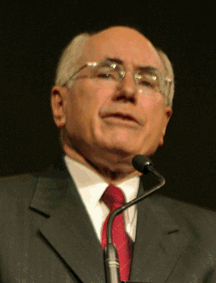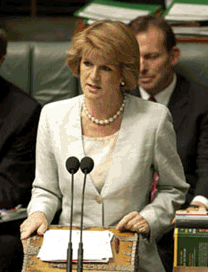|
Editorial-30 July 2006 |
|
|
|
|
|
|
|
Over the past six weeks Julie Bishop, the Minister for Education, Science and Training, has thrown off her cloak of near anonymity and become a very publicly visible and vocal exponent, if not a champion comparable to her processor Brendan Nelson, of Prime Minister John Howard's higher education and research policies.
June 16 - Keynote Address of the Knowledge Transfer and Engagement Forum
Crown Plaza, Darling Harbour, Sydney
On June 27-28 Ms Bishop
attended the meeting of OECD education ministers in Athens --
Higher Education: Quality, Equity and Efficiency.![]()
July 15 - Opening Address to the Higher Education Research and Development Society of Australasia
University of Western Australia, Perth
July 19 - Address to the Sydney Institute on Science and Innovation - Big Science. Big Picture.
41 Phillip Street, Sydney
July 24 - Curtin Institute Public Policy Forum
Curtin University of Technology, Perth
One of the Minister's key talking points is the Research Quality Framework.
Whether or not she discussed the RQF with individuals she met in the UK or the US is not related (for example she had a meeting with the US Presidential science advisor, John Marburger).
The mess in which the UK now finds itself in trying to extricate itself from its Research Assessment Exercise is alluded to only obliquely if that, "It is my view that if we are able to get right the measure of impact Ė in both its form and its recognition Ė then we will have created a research evaluation measure that will greatly surpass those of other nations..."
And she told her audience at the Sydney Institute "I have an idea, framed in part from my current bedtime reading list which includes Peter Dohertyís ďThe Beginnerís Guide to Winning the Nobel PrizeĒ, which lucidly explains the rewards and pitfalls of a career in scientific research in Australia!"
Interestingly Ms Bishop makes no mention as to whether or not she has held discussions with Professor Doherty concerning the efficacy of a Research Quality Framework.
In June 2005, the ABC's Four Corners put to air
and as supplementary material made available on the Internet, extensive interviews with a number of the participants that were used as background material for the program. Below, some excerpts of cogent observations of Professor Doherty.
Professor Doherty. [T]he flaw with the Dawkins model [for Australia's university sector] is really that itís not affordable, that we just donít have that much money. We could put a lot more money into research in this country and weíd still get very high quality produce for it, but itís a matter of what governments decide they can afford. We constantly in the research community of course try to persuade them to spend more but they have other competing priorities of course and itís a balancing act and thatís why we elect people as democratic representatives. I donít see personally why if youíve got a university in a rural area for instance or in an outer city area, thatís doing a very good research job with some particular focus [and] theyíre competing for funds nationally, why they shouldnít continue to do that. I think the problem comes with the way that research support funds outside the competitive system are allocated.
[T]he Australia Research Council and the National Health and Medical Research Council, distribute their resources on the basis of a very intense and very critically reviewed competitive process. It tries to be absolutely fair. Itís a peer review, so the members of the scientific community are reviewing each other and I think itís a very good process, and itís equivalent to the process in the United States used by [the] National Institutes of Health, or in Britain, used by [the] Medical Research Council or [the US] National Science Foundation and so forth.
Q. And by definition, most of that funding will go to centres of excellence.
A. By definitionÖ Thatís right. So you donít really need a Research Assessment Exercise in this country. All you have to do is to look at where the research grant money goes. Now the Americans havenít had a research assessment exercise, and the reason they havenít had that is they simply pay indirect costs on the grants.
As far as Iím concerned you donít allocate research resources to an institution. You allocate them to individuals. Research is about the activities of individual human beings and the groups that they build in competing for the best outcomes, okay. So you donít fund universities to do research; you fund people to do research and you then incidentally fund the institutions that support those people, and the way you do that is through an indirect cost rate mechanism.
I donít think any of the research activity is funded enough in this society to call it a clever country. In fact the clever country thing is an example of hype quite frankly, and I think we can do without the hype and look at the realities of things.Q. So hype aside, what is the funding situation with research in Australia, universities?
A. Itís modest, I think, to say the least. Itís not stellar. Part of the problem is the lack of resources from outside the federal funding sphere. If you were working in the United States you often have access to state funds. Youíll have access to local philanthropies, national philanthropies...
Q. If there was one thing that you could change about the way the system is set up at the moment regarding universities, what would that be?
A. I would like to see them go to an indirect cost rate mechanism for supporting research, which would mean putting more money into the competitive systems. I think the more government money goes into competitive systems, the better quite frankly. I think a competitive model works well for universities. I would like to see a lot of the regulation taken back. The universities are under funded and over-regulated. What we need is the universities to be, we need them to be free to innovate and to develop new programmes and so forth, in a sensible way. I mean some of whatís going on is not sensible.
The foregoing considered, Ms Bishop's observations as told to her four audiences hold some interest. It is remarkable, or it should be, that of all individuals the Minister for Science gives no data on which she bases her sweeping conclusions.
On June 16 Ms Bishop told her audience at Darling Harbour:
The Australian Government announced its commitment to developing a Research Quality Framework in May 2004... Uniquely, the Expert Advisory Group concluded that the Australian RQF should include an assessment of research impact... It is my view that if we are able to get right the measure of impact Ė in both its form and its recognition Ė then we will have created a research evaluation measure that will greatly surpass those of other nations... I propose that the RQF will come into operation in 2008, with the next RQF exercise to be undertaken six years later, that is in 2014.
I believe that an RQF is vital for Australia. We need it to lift our overall level of research quality, and to shift our focus towards research which really does have an impact on day to day life. We must use it as a tool for greater diversity in the higher education sector, focussing universitiesí attention on their strengths... we must be sure to avoid the worst perversions of overseas equivalents.
A month later in Perth following her world-wide tour which included discussions in Great Britain, and the United States:
I believe that a Research Quality Framework (RQF) is vital for Australia. We need it to lift our overall level of research quality, and to shift our focus towards research which really does have an impact on day to day life.
We must use the RQF as a tool for greater diversity in the higher education sector, focussing universitiesí attention on their strengths, and moving away from the ďone-size-fits-allĒ mould of universities.
The overall objective of the RQF is to develop a broad assessment mechanism of research quality and impact that will be relevant across the full breadth of research organisations in receipt of public funding.
The RQF will recognise and reward high quality and high impact research wherever and whenever it occurs.
The Australian Government is developing an RQF to ensure that resources provided to support research are directed to areas of research excellence that generate wider benefit and impact for society.
[S]uch a framework will help business and industry to make decisions about collaboration; and it will provide more transparency allowing students to identify research excellence across all universities and assist in their educational decision making.
[U]niversities will be encouraged to take a rigorous approach to developing and implementing their own research strategies that build on their identified strengths. This process will diversify purpose and content as institutions shift their research focus to those disciplines in which they are at the forefront nationally and internationally and for which they extract significant benefit for their communities.
And to the Sydney Institute:
[W]e can...ensure that the quality of Australian scientific and research endeavour in our areas of strength is world-class and that it is
progressing our social, economic and environmental goals.To that end, I am committed to a Research Quality Framework Ė a new initiative to ensure publicly funded research is measured against international benchmarks for its quality and its impact. Development and implementation of a Research Quality Framework has the potential to provide us, for the first time, with a robust assessment mechanism of both the quality and impact of the research produced by Australian institutions and to act as a driver of excellence on a broad front. Assessment of impact has been the source of some contention, but is also of great academic and intellectual interest. And rightly so, as it has not been done before.
No-one should underestimate the effect the Research Quality Framework will have on Australiaís research activity. No more incentives for mediocrity. The funding must follow excellence and relevance.Then Back to Perth:
The Research Quality Framework will drive diversity as universities pursue excellence in research. Many will need to focus in pockets of research excellence. There wonít be the financial incentive for any university to undertake research outside its areas of strength.
This process will diversify purpose and content as institutions shift their research focus to those disciplines in which they are at the forefront nationally and internationally and for which they extract significant benefit for their communities, as we measure quality and impact.
Alex Reisner
The Funneled Web


